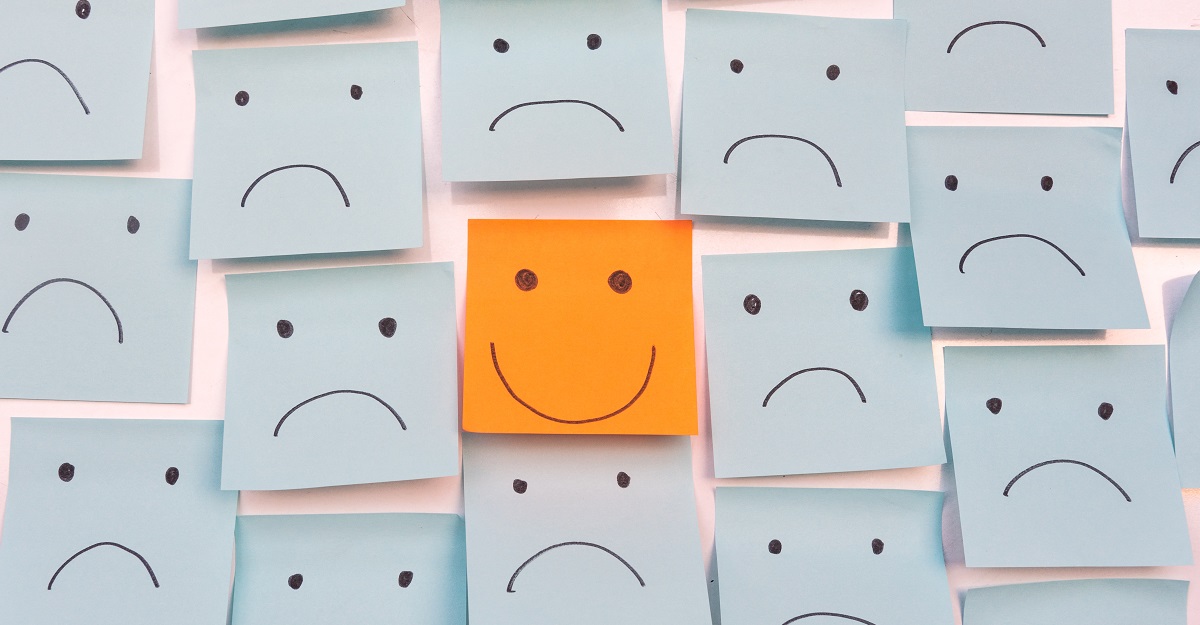Am I An Introvert? 7 Myths About Introverts and How to Tell if You Are One
Published By Justin Baksh, LMHC, MCAP
March 1, 2024

Cassidy stood on the edge of the bustling restaurant, the murmur of conversation washing over her like a wave. Fairy lights twinkled overhead, casting a warm glow on the animated faces, but Cassidy felt a knot of anxiety tightening in her stomach. This was the annual company party, and while everyone else seemed energized by the festive atmosphere, Cassidy felt a familiar wave of introversion washing over her.
She scanned the room, searching for a familiar face. Spotting her colleague, Steve, at a corner table with a few others, Cassidy took a deep breath and navigated the crowd. As she approached, the lively chatter seemed to amplify, making her smile feel strained.
The conversation at the table flowed easily, filled with anecdotes and laughter. Cassidy listened intently, occasionally adding a thoughtful observation, but the constant social interaction started to drain her energy. After a while, she excused herself, explaining she needed to “freshen up.”
Taking refuge in the quiet hallway, Cassidy leaned against the wall, closing her eyes and taking slow, calming breaths. The brief respite helped recharge her a bit. She rejoined the party, this time opting for a quieter corner where she could engage in one-on-one conversation with a colleague who shared similar interests. As the night went on, she found pockets of enjoyment, sharing genuine laughter and engaging in meaningful conversations.
By the end of the evening, Cassidy felt a pleasant exhaustion, the kind that came from using her social energy wisely. While she wasn’t the one lingering at the party until the last call, she left feeling connected to her colleagues, having experienced the work function in a way that felt authentic and comfortable for her introverted nature.

What is an Introvert?
Cassidy’s experience is a classic example of how an introvert navigates a social event. While some might see her need for occasional breaks as shyness or disinterest, it’s actually a vital part of how she manages her energy in a stimulating environment.
But what does it really mean to be an introvert, and why are those moments of solitude so important?
An introvert is someone who recharges and finds comfort in solitude. They often prefer quiet reflection and the company of a few close friends over large social gatherings. This personality type thrives on internal experiences, and they can be highly creative and imaginative, typically taking inspiration from their inner world.
When it comes to expressing themselves, they may be more deliberate and thoughtful in their communication, taking time to process information before speaking.
According to Myers-Briggs, an MTBI global sample in 2020 determined that approximately 56.8% of people worldwide are introverts. Introversion is a natural and healthy personality trait, and there are many successful and well-adjusted introverts in the world.
Are Introverts All Shy and Quiet?
No. Misconceptions about introverts often stem from a lack of understanding about what introversion truly entails, leading to stereotypes and oversimplifications. Let’s clear up some common misunderstandings about what being an introvert really means.
7 Myths About Introverts

MYTH #1: Introverts are shy or antisocial
REALITY: Shyness is not always a part of Introversion.
Introverts might prefer smaller gatherings or one-on-one conversations, but their preference for less stimulating environments does not necessarily mean they are afraid of social interaction. Introverts can enjoy socializing; they simply have different energy levels and recharge by spending time alone.

MYTH #2: Introverts don’t like talking.
REALITY: Introverts do enjoy meaningful conversations
Introverts especially enjoy conversations that allow for depth and exploration of complex subjects. They might avoid small talk – not because they dislike talking, but because they find deeper conversations more fulfilling.

MYTH #3: Introverts are not good leaders.
REALITY: Introverts make a real difference to the bottom line of organizations they lead.
Introverts often possess qualities like reflective thinking, the ability to listen, and a thoughtful approach to problem-solving – all of which is invaluable in leadership positions. Introverted leaders might lead differently, prioritizing listening over speaking and reflection over immediate action; however this “non-reactive” approach is highly effective. From maximizing revenue through observation and analysis and avoiding impulsive expenditures that drain finances to drilling down on internal processes that streamline operations, introverts can truly set your organization up for success. Bill Gates, Warren Buffet, Elon Musk, Mark Zuckerberg, Steven Spielberg, Larry Page, and many more are successful introverted leaders.

MYTH #4: Introverts are always quiet and reserved.
REALITY: While introverts might be quieter in larger groups or in unfamiliar situations, they are not universally quiet or reserved.
In comfortable settings or when discussing topics they are passionate about, introverts can be quite talkative and expressive. In new situations, however, what is perceived as “quiet and reserved” by others is oftentimes the introvert sizing up the situation. They aren’t ones to act or speak before thinking about the consequences of those words and actions. Thus, if they aren’t sure of the group or the place in which they find themselves, they usually wait until they are before engaging more… or at all.

MYTH # 5: Introverts don’t like to go out or have fun.
REALITY: Introverts do enjoy going out and having fun, but their preferences for activities and environments might differ from those of extroverts.
Introverts might choose quieter settings, smaller groups, or more intimate gatherings, finding these experiences more enjoyable and less draining. They may eschew the outdoor concert or festival for a a conversation over coffee, or dinner with a small group of friends.

MYTH #6: Introverts are less emotionally expressive.
REALITY: Introverts may express their emotions differently than extroverts
Introverts often prefer to process their feelings internally or share them in a more intimate setting, rather than displaying them outwardly. This doesn’t mean they feel emotions any less deeply than extroverts. It just looks different from the outside.

MYTH #7: Introverts prefer to be alone because they dislike people.
REALITY: The introvert’s need for solitude is not about disliking people but about recharging energy.
Introverts cherish deep connections and typically maintain a tight-knit group of trusted friends with whom they share profound bonds. Crowded venues, parties, and other situations with large groups of people, however, can be draining to an introvert. That’s why you will see them head for a less crowded area or pair off for a one-on-one conversation in these situations. They may also leave social gatherings earlier, needing time to recharge on their own. This also applies in a work setting; they may need to retreat to the confines of their own office for a while to regroup,
The Introverted Brain
Scientific studies show that the brains of introverts differ from those of extroverts in a few ways. These differences have been observed behaviorally in the first year of life, suggesting a strong genetic basis. In other words, introverts are born, not made.

Introverts have a thicker prefrontal cortex
Introverts have more grey matter in areas of the prefrontal cortex. A thicker prefrontal cortex reflects their preference for thinking more deeply about things before they act. Thus, they make decisions less quickly than extroverts and appear to move less slowly on new information as they are process it more than extroverts do. Introverts also tend to think more abstractly than do extroverts, who have a tendency to think about the here and now.

Introverts are More Sensitive to Dopamine & Prefer Acetylcholine
Introverts have fewer dopamine receptors than extroverts. This means that extroverts need more stimulation than do introverts to feel the effects of the neurotransmitter. It’s also easier for the introvert to feel overstimulated and overwhelmed by social interaction than their extroverted friends. Instead, introverts have more acetylcholine receptors and thus get more pleasure from activities that generate its release, getting a surge of it when they are engaged in solitude or with a small group of friends.

Introverts Use a Longer Pathway to Process Information
In social situations, introverts process information through a longer pathway than do extroverts. For example, new information from the senses goes through the right front insular cortex, the area of the brain that picks up on errors. It also passes through the frontal lobe, where possible outcomes are weighed. This new information is also connected to long-term memories – as sometimes the past is the best predictor of future outcomes. Extroverts have a much shorter pathway and thus respond quickly to what is happening in the present. Introverts, meanwhile, have a lot going on internally and need extra time to process it before responding.
There is evidence that people become more introverted as they age. However, a tendency toward introversion versus extroversion, or temperament, sticks with us.
Am I an Introvert? How to Know
Wondering if you might be an introvert? This quiz is not a diagnostic tool but rather a way to understand your tendencies or preferences. Respond to each statement with “Often,” “Sometimes,” or “Rarely,” and keep track of your answers.
Introvert Quiz
Wondering if you might be an introvert? This quiz is not a diagnostic tool but rather a way to understand your tendencies or preferences. Respond to each statement with “Often,” “Sometimes,” or “Rarely,” and keep track of your answers.
- Social Gatherings: After attending a large social gathering, do you feel the need to spend time alone to recharge?
- Small Talk: Do you find small talk to be more exhausting than engaging or meaningful conversation?
- Alone Time: Do you often find solitude more comforting and productive than being in a group?
- Deep Conversations: Do you prefer having a few deep and meaningful conversations over many superficial ones?
- Processing Thoughts: Do you often prefer to think things through before speaking or acting?
- Social Preferences: Given the choice, would you rather spend a quiet evening with a close friend than at a loud party?
- Energy Levels: Do large crowds and busy environments drain your energy more quickly than quiet, less populated settings?
- Focus and Concentration: Do you find that you can concentrate better or be more creative when you’re alone?
- Friendships: Do you have a small circle of close friends rather than a large network of acquaintances?
- Leisure Activities: Do you often choose hobbies or activities that can be done alone or with a few people over group activities?
SCORING
- Mostly “Often”: Your responses suggest you lean towards introversion. You likely find energy in solitude and prefer deep, meaningful interactions.
- Mix of “Often” and “Sometimes”: You may have ambivert traits, displaying a balance between introvert and extrovert tendencies depending on the context or situation.
- Mostly “Sometimes” or “Rarely”: You might lean more towards extroversion, finding energy in social interactions and dynamic environments.
The Care & Keeping of You, the Introvert
Introverts, much like everyone else, thrive on self-care routines that are tailored to their distinct needs and inclinations. Here are several ways you (or the introverts you love) can nurture their wellbeing.
Tips for Introverts
- Prioritize Alone Time: Schedule regular periods of solitude to recharge. Whether it’s reading, meditating, or simply sitting quietly, find activities that allow you to recover from social fatigue
- Create Boundaries: Set clear boundaries around your time and energy. Master the art of declining social commitments that seem daunting, and give precedence to pursuits that resonate with your desire for tranquility and contemplation.
- Engage in Meaningful Conversations: Seek out and foster relationships where deep, meaningful conversations are welcomed and valued. These interactions can be more fulfilling than superficial small talk.
- Pursue Passion Projects: Allocate time for activities or hobbies that bring you joy and can be enjoyed solo. This approach fosters a feeling of achievement and personal contentment.
- Limit Overstimulation: Be mindful of environments that cause sensory overload. Use strategies such as headphones with calming music or breaks in a quiet space to manage overstimulation.
- Practice Mindfulness and Reflection: Incorporate mindfulness practices, such as meditation or journaling, to help process experiences and emotions. Reflective practices can enhance self-awareness and emotional regulation.
- Plan Social Interactions: When socializing is necessary, plan it in a way that feels manageable. Opt for smaller gatherings or one-on-one meetings, and always give yourself time to rest and recharge afterward.
- Embrace Your Introversion: Recognize your introverted nature as the strength it is. Appreciating the value in your perspective and way of being can bolster self-esteem and resilience.
- Seek Out Quiet Spaces: Find or create a personal space dedicated to quiet and relaxation. Having a sanctuary where you can retreat and feel safe is vital for mental health.
- Maintain Physical Health: Regular exercise, a balanced diet, and adequate sleep are essential for everyone, including introverts. Physical well-being significantly impacts mental and emotional health.
- Explore Online Communities: If in-person interactions are draining, consider connecting with like-minded individuals through online forums or social media groups focused on shared interests.
- Professional Support: If needed, seek out counseling or therapy with professionals who understand introversion. They can offer strategies to navigate challenges and support mental health.
Self-Care is Key
Self-care is deeply personal, and what works best will vary from one introvert to another. The key is to listen to your needs and respond with kindness and understanding, allowing yourself the space and activities that support your well-being.
In embracing these self-care strategies, introverts can forge a path to greater well-being and personal fulfillment. By honoring your introverted nature, setting boundaries, and engaging in activities that resonate with your inner self, you open the door to a balanced and enriching life. Keep in mind, practicing self-care isn’t an act of selfishness; it’s an essential routine for preserving your psychological, emotional, and physical well-being. Here’s to celebrating your introversion and nurturing your unique needs in a way that brings joy, peace, and satisfaction to your life.
- Holmes, A. J., Lee, P. H., Hollinshead, M. O., Bakst, L., Roffman, J. L., Smoller, J. W., & Buckner, R. L. (2012). Individual Differences in Amygdala-Medial Prefrontal Anatomy Link Negative Affect, Impaired Social Functioning, and Polygenic Depression Risk. Journal of Neuroscience, 32(50), 18087–18100.
- Infant temperament predicts introversion in adulthood. (2020, April 27). National Institutes of Health (NIH).
- Jenn Granneman. (2019, June 27). Introverts’ and Extroverts’ Brains Really Are Different, According to Science. IntrovertDear.com
- Neo, D. P. (2018, September 16). What everyone gets wrong about introverts — including why they are not. Dr Perpetua Neo.



